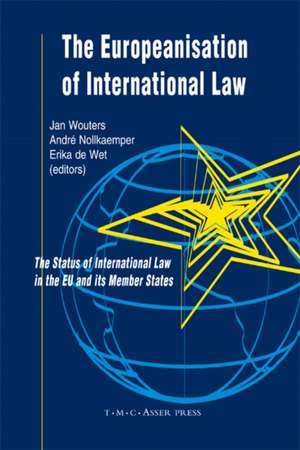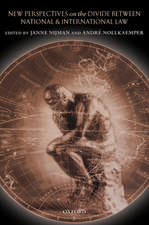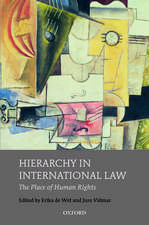The Europeanisation of International Law: The Status of International Law in the EU and its Member States
Editat de Jan Wouters, André Nollkaemper, Erika De Weten Limba Engleză Hardback – 2 oct 2008
Preț: 370.34 lei
Nou
Puncte Express: 556
Preț estimativ în valută:
70.87€ • 73.72$ • 58.51£
70.87€ • 73.72$ • 58.51£
Carte tipărită la comandă
Livrare economică 10-16 aprilie
Preluare comenzi: 021 569.72.76
Specificații
ISBN-13: 9789067042857
ISBN-10: 9067042854
Pagini: 238
Ilustrații: 260 p.
Greutate: 0.54 kg
Ediția:1st Edition.
Editura: T.M.C. Asser Press
Colecția T.M.C. Asser Press
Locul publicării:The Hague, Germany
ISBN-10: 9067042854
Pagini: 238
Ilustrații: 260 p.
Greutate: 0.54 kg
Ediția:1st Edition.
Editura: T.M.C. Asser Press
Colecția T.M.C. Asser Press
Locul publicării:The Hague, Germany
Public țintă
ResearchCuprins
Introduction: The ‘Europeanisation’of International Law.- Introduction: The ‘Europeanisation’of International Law.- The Phenomenon of Europeanisation.- Europeanisation Beyond Supremacy.- The Emergence of A European System of Public International Law: The Eu and its Member States as Strange Subjects.- The Status of International Law in the European Legal order: The Case of International Treaties and Non-Binding International Instruments.- The European Court of Justice and Public International Law.- Customary International Law, Decisions of International Organisations and Other Techniques for Ensuring Respect for International Legal Rules in European Community Law.- Consequences of Europeanisation For Domestic Law, International Law and Judicial Protection in the EU.- ‘Unionisation’and ‘Conventionisation’ of Fundamental Rights in Europe: The Interplay Between Union and Convention Law and its Impact on The Domestic Legal Systems of The Member States.- The Status of ‘Europeanised’ International Law in Austria, Switzerland and Liechtenstein.- A Triangular Relationship Between Public International Law, Ec Law and National Law? The Case of Hungary.- Un Sanctions and Judicial Review.- Europe, America and The ‘Unity’ of International Law.








